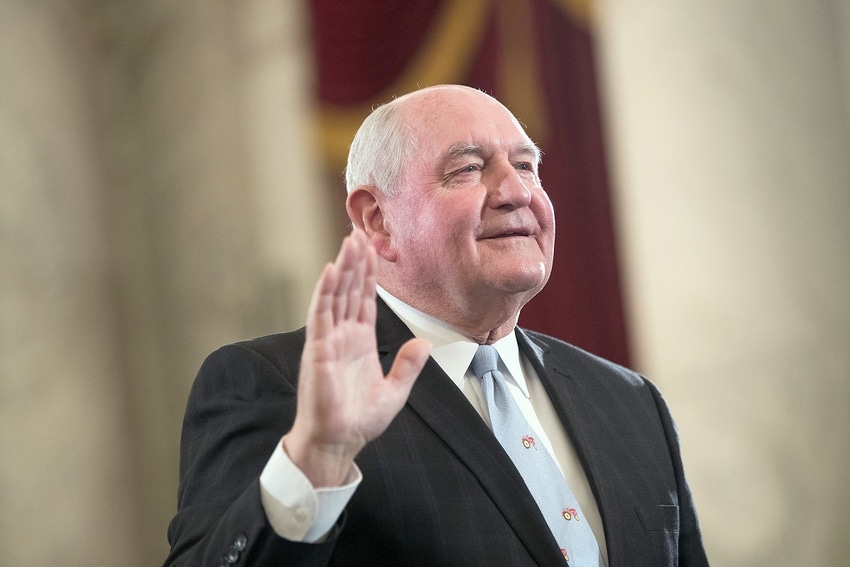
Producers have been concerned that the President's tough stand on undocumented immigrants might cause instability in their farming operations and could further cause an increase in food costs in the months ahead. Perdue said the President is open to helping agricultural producers protect their immigrant work force.

Just a few days after Sonny Perdue assumed the role of Agriculture Secretary for the Trump administration he wasted little time putting his right foot forward. He announced during a Friday meeting that he believes agricultural producers need not worry about immigrant farm worker problems under the Trump administration's aggressive immigration policy, and also offered news about a school lunch program initiative that could give school districts more leeway in setting school lunch menu offerings.
Perdue was a guest speaker at a special Town Hall Meeting Friday, April 28, sponsored by the Agricultural Business Council of Kansas City, his first meeting outside of Washington since he assumed duties as Secretary of Agriculture.
Of concern to many farmers, Perdue told those in attendance that the President will not focus his immigration efforts on deporting farm workers even if they are illegally in the United States. Producers have been concerned that the President's tough stand on undocumented immigrants might cause instability in their farming operations and could further cause an increase in food costs in the months ahead. Perdue said the President is open to helping agricultural producers protect their immigrant work force. Farm advocacy groups have previously warned federal officials that if Trump deports millions of illegal workers, farm expenses will jump drastically—and quickly.
FARM LABOR CRUCIAL
"He understands there are long-term immigrants, [including] undocumented immigrant laborers, [and] many of them are doing a great job contributing to the economy of the United States," Perdue said. "That is not his focus nor will that be my focus."
Secretary Perdue may have been referencing a move by the U.S. Citizenship and Immigration Services (USCIS), a division of the Department of Homeland Security, which announced last month they are granting extended work permits for hundreds of thousands of illegal immigrants from El Salvador who receive Temporary Protected Status (TPS). El Salvador is currently one of 13 countries whose citizens are eligible to receive TPS. The designation, made by the Secretary of Homeland Security, is for countries whose circumstances have been deemed too dangerous for its residents to return home.
(EDITOR'S NOTE: There seems to be some confusion however whether the temporary protected status umbrella will apply to immigrants from Mexico. According to the wording of the USCIS, they will not be included.)
Recipients of TPS receive work permits, welfare, drivers licenses, social security, and protection from deportation. While it is meant to be temporary, nearly 60,000 Hondurans have been receiving TPS since 1999. TPS normally lasts for 18 months, and it is up to the secretary of homeland security to renew the status. Last July, then-DHS Secretary Jeh Johnson extended TPS for an estimated 195,000 El Salvadorans. This was because of slow recovery from a 2001 earthquake and high crime in the Central American country. The TPS status is set to expire for these workers in March 2018.
The other countries covered by the current TPS include workers from: Guinea, Honduras, Haiti, Liberia, Nepal, Nicaragua, Sierra Leone, Somalia, Sudan, South Sudan, Syria, and Yemen.
Perdue told those at the meeting he has hired a former American Farm Bureau Foundation attorney to present a blueprint to the White House identifying immigrants who contribute to the country in hopes of swaying the President's opinion of immigrant farm worker policy.
SCHOOL LUNCH
In addition to immigration worker issues, Perdue also discussed possible changes in USDA-sponsored school lunch programs. He and Republican Sen. Pat Roberts of Kansas will initiate a new interim rule designed to provide flexibility for school meals at an elementary school in Leesburg, Virginia, this week. According to a memorandum about the initiative, it will provide regulatory flexibility to public schools.
Roberts and Sen. Debbie Stabenow, D-Mich., unsuccessfully tried to loosen school lunch rules last May. Their bill would have eased whole grain requirements and allowed schools two more years to reduce sodium levels. The bill has not successfully made it to the Senate floor so far.
Roberts has argued that a comprehensive school lunch nutrition bill supported by former President Obama and promoted by First Lady Michelle Obama has created a hardship for some schools that have experienced trouble conforming to the new lunch menu mandates. Roberts argued schools needed more time to make the adjustment.
The new initiative in the Virginia school represents an effort to ease those restrictions and give schools more authority in planning student lunches.
About the Author(s)
You May Also Like





